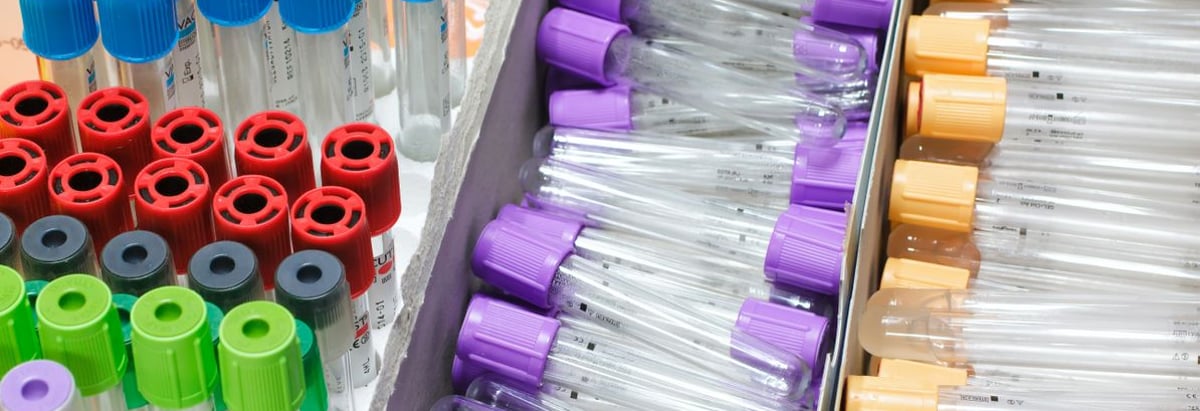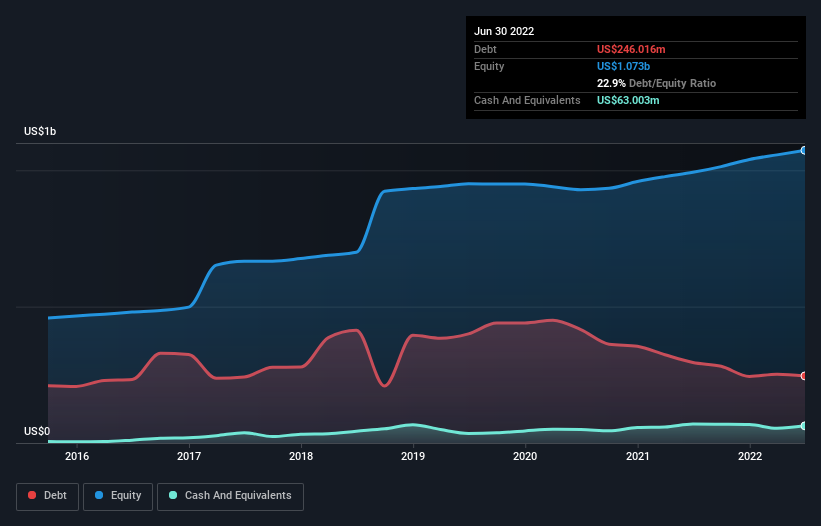- United States
- /
- Medical Equipment
- /
- NasdaqGS:MMSI
Merit Medical Systems (NASDAQ:MMSI) Seems To Use Debt Rather Sparingly

David Iben put it well when he said, 'Volatility is not a risk we care about. What we care about is avoiding the permanent loss of capital.' So it seems the smart money knows that debt - which is usually involved in bankruptcies - is a very important factor, when you assess how risky a company is. We can see that Merit Medical Systems, Inc. (NASDAQ:MMSI) does use debt in its business. But is this debt a concern to shareholders?
When Is Debt A Problem?
Debt is a tool to help businesses grow, but if a business is incapable of paying off its lenders, then it exists at their mercy. Ultimately, if the company can't fulfill its legal obligations to repay debt, shareholders could walk away with nothing. However, a more common (but still painful) scenario is that it has to raise new equity capital at a low price, thus permanently diluting shareholders. Of course, plenty of companies use debt to fund growth, without any negative consequences. The first thing to do when considering how much debt a business uses is to look at its cash and debt together.
View our latest analysis for Merit Medical Systems
What Is Merit Medical Systems's Debt?
As you can see below, Merit Medical Systems had US$246.0m of debt at June 2022, down from US$295.2m a year prior. However, because it has a cash reserve of US$63.0m, its net debt is less, at about US$183.0m.

How Strong Is Merit Medical Systems' Balance Sheet?
According to the last reported balance sheet, Merit Medical Systems had liabilities of US$195.6m due within 12 months, and liabilities of US$362.6m due beyond 12 months. Offsetting these obligations, it had cash of US$63.0m as well as receivables valued at US$169.9m due within 12 months. So its liabilities outweigh the sum of its cash and (near-term) receivables by US$325.3m.
Given Merit Medical Systems has a market capitalization of US$3.37b, it's hard to believe these liabilities pose much threat. Having said that, it's clear that we should continue to monitor its balance sheet, lest it change for the worse.
We measure a company's debt load relative to its earnings power by looking at its net debt divided by its earnings before interest, tax, depreciation, and amortization (EBITDA) and by calculating how easily its earnings before interest and tax (EBIT) cover its interest expense (interest cover). Thus we consider debt relative to earnings both with and without depreciation and amortization expenses.
Merit Medical Systems has a low net debt to EBITDA ratio of only 0.89. And its EBIT covers its interest expense a whopping 29.0 times over. So we're pretty relaxed about its super-conservative use of debt. Even more impressive was the fact that Merit Medical Systems grew its EBIT by 108% over twelve months. If maintained that growth will make the debt even more manageable in the years ahead. The balance sheet is clearly the area to focus on when you are analysing debt. But ultimately the future profitability of the business will decide if Merit Medical Systems can strengthen its balance sheet over time. So if you're focused on the future you can check out this free report showing analyst profit forecasts.
Finally, while the tax-man may adore accounting profits, lenders only accept cold hard cash. So it's worth checking how much of that EBIT is backed by free cash flow. Over the last three years, Merit Medical Systems actually produced more free cash flow than EBIT. There's nothing better than incoming cash when it comes to staying in your lenders' good graces.
Our View
The good news is that Merit Medical Systems's demonstrated ability to cover its interest expense with its EBIT delights us like a fluffy puppy does a toddler. And the good news does not stop there, as its conversion of EBIT to free cash flow also supports that impression! It's also worth noting that Merit Medical Systems is in the Medical Equipment industry, which is often considered to be quite defensive. It looks Merit Medical Systems has no trouble standing on its own two feet, and it has no reason to fear its lenders. To our minds it has a healthy happy balance sheet. When analysing debt levels, the balance sheet is the obvious place to start. But ultimately, every company can contain risks that exist outside of the balance sheet. Be aware that Merit Medical Systems is showing 2 warning signs in our investment analysis , you should know about...
Of course, if you're the type of investor who prefers buying stocks without the burden of debt, then don't hesitate to discover our exclusive list of net cash growth stocks, today.
New: Manage All Your Stock Portfolios in One Place
We've created the ultimate portfolio companion for stock investors, and it's free.
• Connect an unlimited number of Portfolios and see your total in one currency
• Be alerted to new Warning Signs or Risks via email or mobile
• Track the Fair Value of your stocks
Have feedback on this article? Concerned about the content? Get in touch with us directly. Alternatively, email editorial-team (at) simplywallst.com.
This article by Simply Wall St is general in nature. We provide commentary based on historical data and analyst forecasts only using an unbiased methodology and our articles are not intended to be financial advice. It does not constitute a recommendation to buy or sell any stock, and does not take account of your objectives, or your financial situation. We aim to bring you long-term focused analysis driven by fundamental data. Note that our analysis may not factor in the latest price-sensitive company announcements or qualitative material. Simply Wall St has no position in any stocks mentioned.
About NasdaqGS:MMSI
Merit Medical Systems
Designs, develops, manufactures, and markets single-use medical products for interventional, diagnostic, and therapeutic procedures in the United States and internationally.
Excellent balance sheet with proven track record.
Similar Companies
Market Insights
Community Narratives



